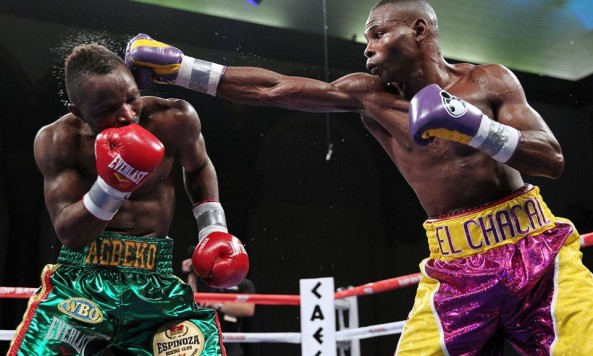(Guillermo Rigondeaux punches Joseph Agbeko, not that anyone saw it; credit: Chris Farina, Top Rank)
Nobody expected Guillermo Rigondeaux to do great numbers as a headliner on HBO going head to head with a card over at Showtime featuring bigger names, but then, nobody probably expected this weekend's bout to set an all-time low for HBO's Boxing After Dark program in the 17-year history of the show: 518,000 viewers, on average.
That it did shittily at all was easily forseeable for a lot of reasons.
- Guillermo Rigondeaux is a little guy. He's the 122-pound champion, and in his Fighter of the Year campaign in 2012, fellow 122-pounder Nonito Donaire snagged 835,000, 988,000, 1.02 million and 1.3 million viewers for his four fights. Except for the 1.3 million, all of those were well below the HBO average. Earlier this year, Donaire-Rigo did 1.1 million.
- Rigo was not a proven ratings draw. It took an awful lot of marketing muscle and repeated appearances for Donaire, with his built-in Filipino following, to get to even the above meager figures. Donaire has been appearing regularly on Showtime or HBO since 2007. Rigo debuted on HBO in 2010 and half his appearances have been on pay-per-view undercards.
- Rigo-Joseph Agbeko went up against a Showtime card headlined by far more well-known fighters. Zab Judah and Paulie Malignaggi are names in this sport, and they fought the same night. Apparently it was a big college football night. Let's say the audience for the two boxing main events isn't split — you're looking at 1.007 million. There's no guarantee, of course, that everyone who watched Malignaggi-Judah would've watched Rigo-Agbeko if they didn't have the Malignaggi-Judah option, but at least a portion of the audience would've.
- Top Rank, Rigo's promoter, isn't interested in promoting him. If there were any stories about the big push Top Rank gave Rigo for this fight, I missed them. More likely, they invested almost nothing in the promotion, because Bob Arum has made his distaste for Rigo clear. They put the fight in a location where Cuban fighters don't have a track record of success, Atlantic City, with a rival show not far in Brooklyn, thereby guaranteeing a skeletal audience, and big enthusiastic audiences can help make a fight more of an "event."
- The match-up was so-so. No one expected Agbeko to be competitive, especially coming off a long layoff and shaky return bout. Fans saw a wipeout coming. On paper, Agbeko at least offered the possibility of forcing the action and making an entertaining fight, so it wasn't a terrible match-up on paper — just a so-so one. Agbeko, of course, didn't even live up to the part of the bargain involving being aggressive, so that made things even worse.
- Rigo is a technical boxer viewed as boring by a great number of fans. I put this last not because it's the least important, but because I think it's been overemphasized overall. Technical boxers are, often, draws, and ratings hits. The Klitschkos are. Floyd Mayweather is. Andre Ward, against Chad Dawson, was. Meanwhile, Lucas Matthysse and Brandon Rios, two favorites of action junkies, have more consistently done small numbers. The purists are a smaller faction of boxing than the blood-and-guts fans, I assume, but allegedly "boring" fighters don't automatically equal small ratings. Rigo was more aggressive Saturday than Agbeko, but while his style is a liability to his capacity to attract viewers, his standoffish personality, his lack of a regional or ethnic following and some other factors explain why he fares poorly in viewership numbers compared even to other allegedly "boring" fighters.
As I mentioned in the Weekend Afterthoughts column, the combination of these factors made it like Top Rank and HBO almost were trying to make Rigo-Agbeko a failure when it didn't need any help. And it was a spectacular one.

